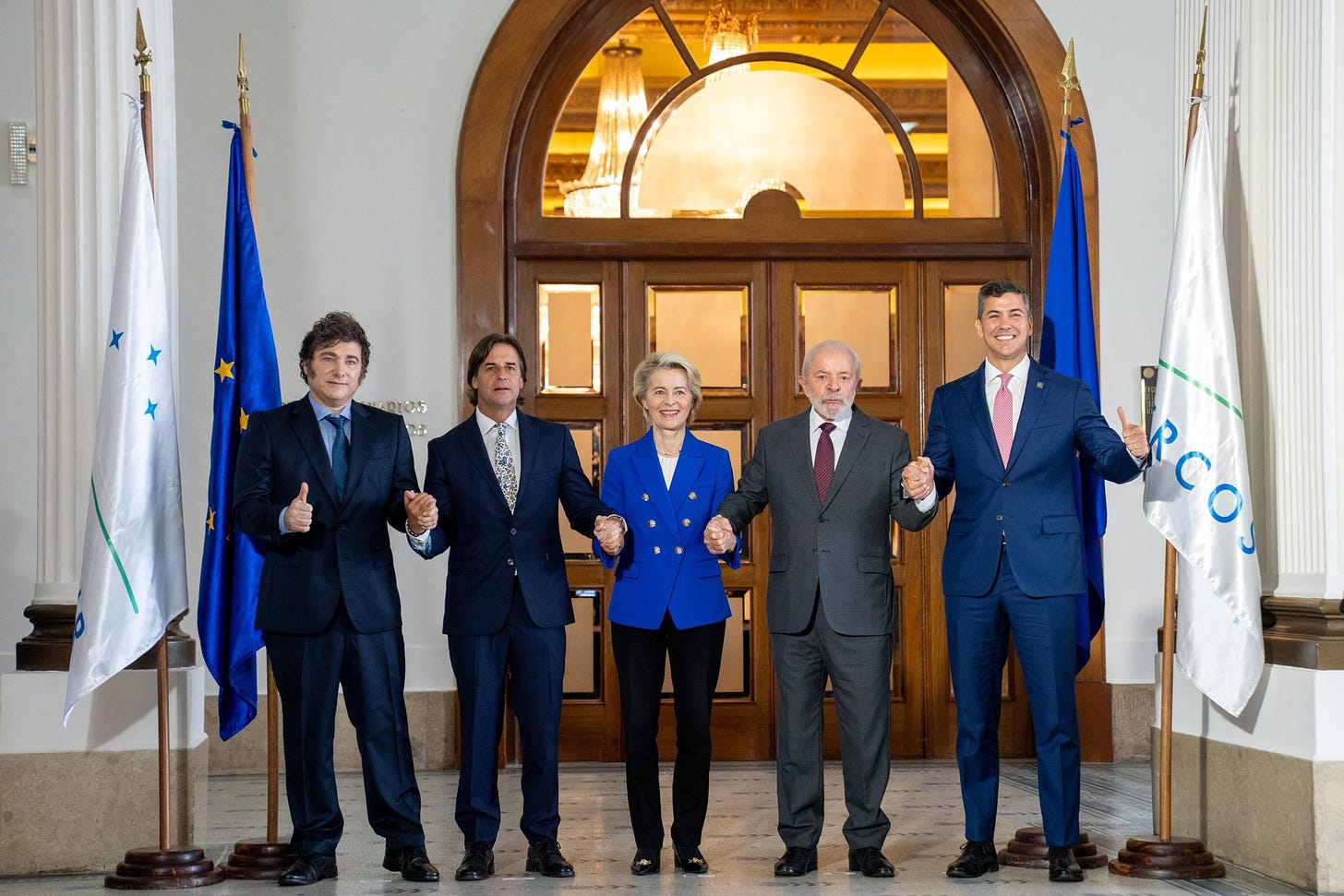Paraguay's Foreign Policy Is In Flux
The Peña administration wrangles with Chinese infiltrators, US narcotics agents, and the mother of all trade agreements.

Welcome back to the Post. There’s loads going on, so rather than one top story, this week I’m bringing you three. Each reflects how Paraguay’s foreign policy is scrambling to adapt to an increasingly uncertain, multipolar world.
If Paraguay ever really was an island surrounded by land, that’s no longer the case. Decisions taken in Washington, Beijing, Taipei and Brussels — and how Asunción shapes them and responds — profoundly affect the fate of millions of Paraguayans.
Not into geopolitics? I’ve got just the thing: a breakdown of the best fine dining the capital has to offer, with an emphasis on those places pushing forward the New Paraguayan Cuisine. It’s the perfect excuse to blow your aguinaldo (Christmas bonus).
The Headlines:
Paraguay kicks out Chinese diplomat.
Xu Wei, Beijing’s senior envoy to Latin America, was in Asunción last week on a visa to attend the UNESCO conference. But he overstayed his welcome by meeting with legislators Éver Villalba and Hugo Meza from the opposition Liberal Party (PLRA). They said Xu promised major infrastructure projects if Paraguay were to finally recognise Beijing. “It is either China or Taiwan,” Xu told a throng of reporters in the corridors of congress, dangling the prospect of expanded trade along with “thousands more” advantages. “I recommend that the government of Paraguay make a correct decision as soon as possible.”
Paraguay’s government scrambled to respond. The foreign ministry accused Xu of skipping the UNESCO meeting to pursue a “parallel agenda” and interfere in Paraguay’s “internal affairs.” On Thursday, it cancelled Xu’s visa and gave him 24 hours to leave the country, which he finally did — a day late — on Saturday. Beijing, at least in public, reacted angrily. A spokesperson said that Xu’s expulsion represented a “serious violation” of diplomatic norms. But in reality, China seems to have got what it wanted: a chance to ruffle some feathers and stoke doubts about whether Paraguay’s ongoing alliance with Taiwan is really in the country’s best interests, or rather mainly suits the ruling Colorado clique.
The squabble is the latest twist in the Paraguay-Taiwan-China love triangle. With Taiwan’s few remaining allies falling like dominoes, Tapei, Beijing, and Washington are ramping up lobbying and (counter)espionage efforts. Last month, US military intelligence and their local counterparts reportedly detected a major cyberattack on the Paraguayan government by Flax Typhoon, a Chinese hacking group. Taiwan is redoubling its perks: slashing tariffs on Paraguayan pork, four more Huey helicopters, an industrial hub in Alto Paraná. But the calculus seems to be inexorably shifting in China’s favour.
“Within the next seven or eight years,” former senator Hugo Richer (Frente Guasú) suggested last week, “Paraguay will have to redefine its geopolitical strategy … sooner or later, China will be incorporated into our political, commercial and economic life.” Read more below:
Anti-drug cooperation on a knife-edge.
Late on Friday, the Washington Post broke the news that Paraguay’s anti-narcotics agency SENAD will no longer be cooperating with the United States. The decision was communicated to the US Drug Enforcement Administration on December 3 and will take effect from January. It’s a dramatic shift, one which US officials and Paraguayan prosecutors warned could imperil Paraguay’s fight against the transnational criminal groups that are shifting ever-greater massive amounts of cocaine through Paraguay en route to the Southern Cone, Africa and Europe. “We are concerned about what it means that Paraguay’s antidrug agency no longer wants to be part of such a successful mechanism,” said one US official.
In recent years, US-Paraguay drug enforcement has centred on the Sensitive Intelligence Unit (SIU). Made up of selected SENAD and Paraguayan police officers, it’s made record cocaine busts and pulled off a sweeping money-laundering investigation in 2022. A ULTRANZA exposed how cocaine profits were being laundered through luxury properties, ranches, football clubs and churches with links to senior Colorado Party politicians, and impounded apartments, cattle and luxury vehicles worth $100m. But the SIU’s autonomy — and its role in a raid in August that saw congressman Eulalio ‘Lalo’ Gomes shot dead — has earned it powerful enemies. "The order came from above,” one SENAD official told WaPo.
Paraguay’s government has downplayed the significance of the move. It says it is not ending joint anti-drug initiatives with the US, but channelling them via the national police in the interests of efficiency. “These changes, this restructuring, are [designed] to strengthen cooperation,” SENAD minister Jalil Rachid told reporters. But while SENAD’s trigger-happy agents often disgrace themselves, Paraguay’s underpaid police force is so riddled with corruption and mafia informants that its effectiveness is seriously compromised. US officials expressed hope that the change could be reverted once Donald Trump takes office. For more on the threat posed to Paraguay by the takeover of drug cartels, read on below:
Mercosur inks trade deal with the EU.
European Commission president Ursula von der Leyen flew to Montevideo late last week to meet with the leaders of Brazil, Argentina, Uruguay and Paraguay, which together form Mercosur. The Southern Cone customs union and the EU have spent 25 years negotiating a free trade deal. And on Friday, the two blocs finally got it over the line, announcing the creation of the world’s largest single market of some 700 million people, making up nearly a fifth of the global economy. Von der Leyen hailed it as a victory for “openness and cooperation” versus “isolation and fragmentation.”
But it’s not a done deal. Threats from Donald Trump to slap tariffs on major trading partners — and the growing economic clout of China, which has also mooted a deal with Mercosur — seem to have pushed the EU and its South American counterpart into each other’s reluctant embrace. The agreement has to be approved by the EU parliament and 15 of its 27 member states. Emmanuel Macron in particular is worried about how French farmers will compete against South American crops and meat. Paraguay’s president, Santiago Peña, is meeting him in Paris today. “We have to lose our fears,” Peña told AFP beforehand. “This will bring benefits mainly for Europe and for Latin America as well.”
Those benefits are hotly debated in South America, too. Its consumers will enjoy cheaper European clothes, cars, wines and medicines. As tariffs gradually fall, its farmers will gradually be able to export more beef into the EU. But the agricultural lobby in Brazil and Paraguay have argued that several provisions — like one allowing the deal to be suspended if countries fail to honour their commitments under the Paris climate treaty — amount to a neo-colonial outrage.
Others contend that the deal’s environmental protections are nowhere near enough. Laura Restrepo Alameda of Climate Action Network Latin America said the agreement would push South America “further into ecological collapse” by accelerating the expansion of agribusiness. And as Maxi Manzoni notes over at Consenso, trade deals nearly always stoke commodity-related deforestation. The consequences for the Paraguayan Chaco and Atlantic Forest — and the communities that rely on them for their livelihoods — could be profound.
In other news: Guarania declared Intangible Cultural Heritage | US Embassy slams “unchecked impunity” | Riera condemns congressional pay hike | Bishop calls out corruption | Does Landau junior speak Guaraní? | Peña to open Jerusalem embassy | Taiwanese electric buses en route | $154m Lago Ypacarai cleanup | Paraguay’s German immigration problem







